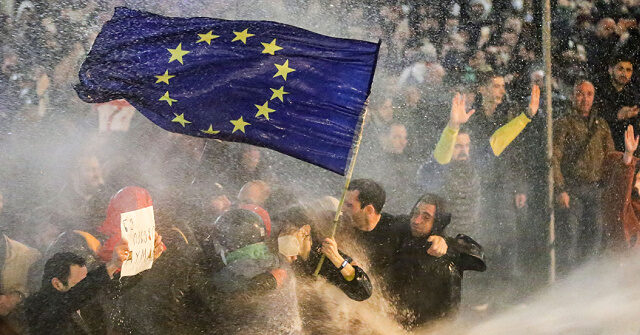Violence has escalated in Tbilisi, Georgia, amid ongoing protests against the ruling government’s decision to suspend talks regarding European Union (EU) membership, a move that has sparked widespread unrest in the capital and beyond. This discontent is grounded in a historical longing among Georgians to align more closely with Western institutions, especially following the Russian invasion of Ukraine in early 2022. The precarious situation in Georgia, a nation that has experienced its own territorial incursions from Russia, has made EU integration a significant point of national interest. In response to the government’s halt of accession discussions, Prime Minister Irakli Kobakhidze warned of mass arrests if the protests continue, highlighting the volatile atmosphere in the country.
The pro-EU sentiment among the Georgian populace stands in stark contrast to the ruling party, Georgian Dream (GD), which has historically favored stronger ties with Russia. Founded by billionaire Bidzina Ivanishvili in 2012, GD has faced accusations of manipulating electoral processes to maintain its grip on power. The party’s hold was solidified through a parliamentary election condemned as unfair by opposition parties and international observers alike. The current president, Salome Zourabichvili, has characterized GD’s actions as a “constitutional coup” and has indicated her willingness to remain in office beyond her term to counter what she views as an undemocratic regime. Amid these tensions, the European Parliament has echoed these concerns, calling for new elections and sanctions against the government.
Protests intensified significantly following the European Parliament’s rejection of the recent elections, accompanied by GD’s drastic decision to freeze EU accession talks until 2028. This development galvanized thousands of demonstrators, who took to the streets brandishing Georgian and EU flags, determined to express their discontent with the government’s direction. As clashes escalated between protesters and police, who employed tear gas and water cannons to disperse crowds, accusations of excessive force surfaced. The Ministry of Interior confirmed injuries to both demonstrators and law enforcement personnel, reflecting the heightened tensions and potential for further escalation.
In the face of the situation, the U.S. State Department condemned both the suspension of EU talks and the violent crackdown on protestors. The statement emphasized the Georgian people’s overwhelming support for EU integration while denouncing the government’s actions as contrary to democratic principles. The U.S. officially suspended key aspects of its strategic partnership with Georgia, citing violations of democratic norms and human rights. In response, Prime Minister Kobakhidze dismissed the U.S. criticism, suggesting it was an attempt by the outgoing administration to complicate the relationship for the incoming leadership, insinuating foreign interference in domestic unrest without presenting concrete evidence.
Kobakhidze’s administration seeks to maintain control by threatening strict legal repercussions against protesters and political opponents. His messaging indicates a willingness to confront dissent while attributing the chaos to external forces aiming to destabilize his government. Meanwhile, the EU, through its foreign policy chief Kaja Kallas, has expressed solidarity with the demonstrators, highlighting the importance of their aspirations for a European future and criticizing the ruling party’s regression from democratic ideals. This declaration signifies the EU’s commitment to supporting the protests, potentially influencing future relations.
As the unrest continues, the geopolitical implications of Georgia’s internal strife are also noteworthy. Russia’s muted response is contrasted by comments from former President Dmitry Medvedev, who has ominously suggested that ongoing turbulence could lead Georgia down a perilous path reminiscent of Ukraine’s predicament. Additionally, President Zourabichvili’s appeal to Western allies for robust support underscores the necessity for external backing in navigating the current crisis. Her call reflects a broader sentiment among many Georgians who wish to reclaim their Euro-Atlantic aspirations amidst the struggle against a government perceived as increasingly authoritarian and pro-Russian. The unfolding situation in Georgia not only highlights national desires for European integration but also poses significant questions about the future of democracy and rule of law in the region.

